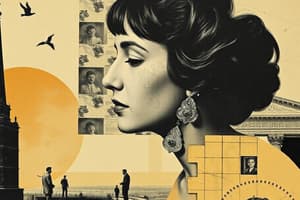Podcast
Questions and Answers
What does the concept of experience in art primarily refer to?
What does the concept of experience in art primarily refer to?
- Studying the materials used in art
- The actual doing of something (correct)
- Learning facts about art history
- Theoretical knowledge of artistic techniques
How does art contribute to culture according to the provided content?
How does art contribute to culture according to the provided content?
- Art serves as a record of a society's culture (correct)
- Art promotes technological advancements in society
- Art brings financial gain to artists
- Art focuses on individual expression only
What is suggested about the relationship between artists and their experiences?
What is suggested about the relationship between artists and their experiences?
- Artists use their experiences to express their feelings (correct)
- Experiences only influence certain types of art
- Artists ignore their experiences when creating art
- Experiences are irrelevant to artistic creativity
What role does imagination play in the creation of art?
What role does imagination play in the creation of art?
What did Dudley et al. (1960) suggest about understanding art?
What did Dudley et al. (1960) suggest about understanding art?
What does the ancient Latin word 'ars' primarily mean?
What does the ancient Latin word 'ars' primarily mean?
During which century did the concept of aesthetics begin to unfold?
During which century did the concept of aesthetics begin to unfold?
Which of the following distinguishes Fine Arts from Useful Art?
Which of the following distinguishes Fine Arts from Useful Art?
What is a key aspect of Art Appreciation as described?
What is a key aspect of Art Appreciation as described?
What role does art play in people's lives according to the provided content?
What role does art play in people's lives according to the provided content?
How is art described in relation to nature in the content?
How is art described in relation to nature in the content?
What misconception about art might be clarified through engagement with personal experiences?
What misconception about art might be clarified through engagement with personal experiences?
Which of these statements is true regarding art's historical perception?
Which of these statements is true regarding art's historical perception?
Flashcards are hidden until you start studying
Study Notes
Understanding Art
- Art derives from the Latin word "ars," meaning craft or specialized skill, primarily associated with practical functions in ancient times.
- During the Renaissance, art was viewed primarily as craftsmanship, lacking today's emotional or aesthetic implications.
- The 17th century marked a shift toward exploring aesthetic ideas, while the 18th century differentiated between Fine Arts (visual arts) and Useful Art (practical artworks).
Art Appreciation
- Art appreciation involves interpreting, understanding, and enjoying man-made art through hands-on experiences with artistic tools and materials.
- It emphasizes possessing works of art for personal admiration and satisfaction.
Assumptions of Art
- Universality: Art is vital in human life, created by cultures throughout history as a significant form of expression.
- Human Expression: Art represents human perspectives on nature, contrasting with the natural world, which exists independently of human intervention.
- Experience: True understanding of art comes from personal engagement and experience, rather than mere intellectual knowledge. Artists express feelings and emotions derived from their experiences in their creations.
- Cultural Reflection: Art serves as a record of cultural history, aiding in the understanding of both past and present cultures through various forms like painting, sculpture, music, and dance.
- Creativity: Art emerges from human imagination and creativity, designed to entertain, inspire, and engage audiences.
Studying That Suits You
Use AI to generate personalized quizzes and flashcards to suit your learning preferences.




